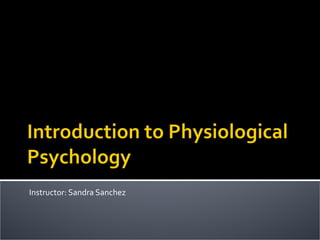
Psy 260 Course Introduction
- 2. Check Blackboard and WebAdvisor Contact Information Phone number e-mail Anything I may need to know about you For example: need DSPS accomodations, planning on missing a week of class, etc
- 3. Course information Contact Information Tentative Schedule Important Dates Grading Syllabus Quiz
- 4. 90,000 graduates a year in the US (National Center for Education Statistics, 2008) 80,000 enter the workforce ▪ 23% in fields that are closely related to psychology ▪ 33% in fields that are somewhat related to psychology ▪ 61% in business and industry ▪ 30% in education ▪ 9% in governmental agencies
- 5. Knowledge base History of Psychology Information gathering and synthesis Research methods and statistical skills Thinking skills Language skills Interpersonal skills Ethics and value
- 6. Conduct research Promote health Help educate Provide social services Assist business & industry
- 7. Becoming in psychologist with an undergraduate degree The path to helping people Therapy is the only career in psychology Psychology is strictly a soft science
- 9. Foundations of Behavioral Neuroscience 8th Edition Neil R. Carlson Prepared by: Grant McLaren, Department of Psychology, Edinboro University of Pennsylvania •This multimedia product and its contents are protected under copyright law. The following are prohibited by law: any public performance or display, including transmission of any image over a network, preparation of any derivative work, including the extraction, in whole or in part, of any images any rental, lease or lending of the program. Copyright © 2011 Pearson Education, Inc. All rights reserved. 9
- 10. Studentslearn about the physiological determinants of behavior. Subjects include behavior evolution, the nervous system, and endocrine glands as well as their relationship to perception, learning, motivation, emotion, and personality.
- 11. Upon successful completion of the course the student will be able to: 1. Differentiate between neural and behavioral processes that are pertinent to physiological psychology 2. Identify major historical research and subsequent findings 3. Analyze current research methodologies utilized in the study of mind-brain and brain-behavior relationships 4. Examine important aspects of evolutionary development and current issues in behavioral neuroscience 5. Distinguish between different types of cells and neural processes in the brain
- 12. 6. Identify and compare chemical communication processes 7. Differentiate components of the central nervous system, peripheral nervous system, and endocrine system 8. Compare and contrast empirical methods of measuring structures and activities within the brain: EEG, MRI, PET, SPECT, and CT 9. Analyze the processing issues involved in the sensory modalities and the relationship between sensation and perception 10. Compare and contrast neural processes involved in emotional expression, mental experience, and behavior
- 13. 11. Examine the neural processes involved in the actions of drugs and teratogens 12. Categorize the chemical, anatomical, and physiological components of the different stages/phases of human consciousness 13. Examine the neural and chemical basis of various psychopathologies 14. Evaluate and compare the neural and chemical basis for reinforcement as well as for associational and operant learning and language 15. Assess the various interventions for psychopathology that have their origins in behavioral neuroscience.